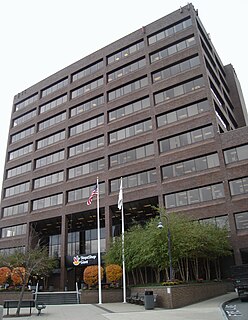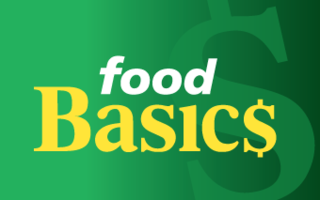Sobeys Inc. is the second largest food retailer in Canada, with over 1,500 stores operating across Canada under a variety of banners. Headquartered in Stellarton, Nova Scotia, it operates stores in all ten provinces and accumulated sales of more than $25.1 billion CAD in the fiscal 2019 operating year. It is a wholly owned subsidiary of Empire Company Limited, a Canadian conglomerate.

The Great Atlantic & Pacific Tea Company, better known as A&P, was an American chain of grocery stores that operated from 1859 to 2015. From 1915 through 1975, A&P was the largest grocery retailer in the United States.

Acme Markets Inc. is a supermarket chain operating 164 stores throughout Connecticut, Delaware, Maryland, New Jersey, New York, and Pennsylvania and, as of 1999, is a subsidiary of Albertsons, and part of its presence in the Northeast. It is headquartered in East Whiteland Township, Pennsylvania, near Malvern, a Philadelphia suburb.
Pathmark is a supermarket chain in the northeastern United States. The chain was started in 1968 when a member of the ShopRite retailer's cooperative broke away to go into business for itself.

The Stop & Shop Supermarket Company, known as Stop & Shop, is a chain of supermarkets located in the northeastern United States. From its beginnings in 1892 as a small grocery store, it has grown to include 415 stores chain-wide.

ShopRite Supermarkets is a retailers' cooperative of supermarkets with stores in six states: Connecticut, Delaware, Maryland, New Jersey, New York, and Pennsylvania.

Key Food Stores Co-op, Inc. is a cooperative of independently owned supermarkets, founded in Brooklyn, New York, on April 20, 1937. Its stores are found in Connecticut, Massachusetts, New Jersey, New York, Pennsylvania, and Florida. The headquarters for the Key Food cooperative is in Matawan, New Jersey; the Chief Executive is Dean Janeway. The cooperative also operates stores under the Key Food Marketplace, Key Fresh & Natural, Food Dynasty, Urban Market, Food World, Food Universe Marketplace, SuperFresh, and The Food Emporium banners.

Food Basics Ltd. is a Canadian super chain owned by Metro Inc. The company operates over 130 stores throughout Ontario.
SuperFresh is a supermarket brand owned by Key Food Stores which operates in New York City and its New Jersey suburbs. The company currently operates ten supermarkets.

Price Rite is a chain of limited-assortment supermarkets found in Connecticut, Maryland, Massachusetts, New Hampshire, New Jersey, New York, Pennsylvania, and Rhode Island. Based in Keasbey, New Jersey, Price Rite is owned by New Jersey-based Wakefern Food Corporation, the cooperative behind ShopRite Supermarkets, Dearborn Market, and The Fresh Grocer. Prior to 2014, Wakefern owned and operated all Price Rite stores.
A warehouse store or warehouse supermarket is a food and grocery retailer that operates stores geared toward offering deeper discounted prices than a traditional supermarket. These stores offer a no-frills experience and warehouse shelving stocked well with merchandise intended to move at higher volumes. Unlike warehouse clubs, warehouse stores do not require a membership or membership fees. Warehouse stores also offer a selection of merchandise sold in bulk, Typically warehouse stores are laid out in a logical format which leads people a certain way around the store to the checkout. As one enters the store they are directed down an aisle of discounted special buys when entering the store. From there the layout typically then leads to the fresh Produce followed by the Deli at the back of the store. Also included bakery and other departments similar to other supermarkets. Another typical feature of these stores is that the customer bags their own groceries which also helps to reduce the overall cost. Many warehouse stores are operated by traditional grocery chains both as a way to attract lower income, value conscious consumers and to maximize their buying power in order to lower costs at their mainstream stores. Notable examples of corporations who operate warehouse stores include United States chains Kroger and Albertsons LLC and the smaller Sacramento-based Nugget Market. However, WinCo Foods is an exception as it is a warehouse chain of its own and not part of a larger chain of traditional supermarkets like A&P, Safeway, Kroger, or Supervalu.

Grand Union Supermarkets, later known as Grand Union Family Markets and often referred to simply as Grand Union, was an American chain of grocery stores that did business primarily in the northeastern United States. It operated stores in other areas of the country including the midwestern and southeastern states, and internationally in the Caribbean and Canada. The company was founded and headquartered in Scranton, Pennsylvania, and moved to Brooklyn, New York in the early 20th century. Grand Union moved again to Elmwood Park, New Jersey and finally to Wayne, New Jersey before the company was forced into Chapter 7 bankruptcy in 2001 and sold to C&S Wholesale Grocers.

Woolworths is an Australian chain of supermarkets and grocery stores owned by Woolworths Group. Founded in 1924, Woolworths along with Coles forms a near-duopoly of Australian supermarkets, accounting for about 80% of the Australian market.

Super Saver Foods was an American price-impact grocery franchise. It is currently owned by Albertsons LLC. It is a no-frills grocery store where the customers bag their own groceries at the checkout.
Sav-A-Center was a trade name owned by The Great Atlantic & Pacific Tea Company.
Foodtown is a northeastern United States supermarket cooperative founded in 1955 by Twin County Grocers in New Jersey. Currently, there are 66 Foodtown stores in New Jersey, New York and eastern Pennsylvania. Foodtown's corporate offices are located in Iselin, New Jersey.

Wild Oats Marketplace is a producer of natural and organic food distributed through partnerships in the United States.
Woolworths was a New Zealand supermarket chain and a unit of Woolworths Group in Australia. The brand was phased-out in the late 2000s, with all stores rebranded as Countdown by 2009.

Fisher Foods, later known as Fazio's, was an American supermarket chain based in Cleveland.

Keells, operating as Jaykay Marketing Services (Pvt) Ltd is a supermarket chain in Sri Lanka owned by the John Keells Group, the largest listed conglomerate in the country. It is one of the three largest supermarket operators in Sri Lanka. Keells opened its first store in 1991 at Liberty Plaza with a promise to bring the freshest products to the Sri Lankan consumers. As a subsidiary of the John Keells Group, it operates 106 supermarkets across the country. Operating with the core purpose of ‘Improving the quality of life for the nation’, Keells has been recognized by many accolades for the work done towards improving the customer shopping experience.














